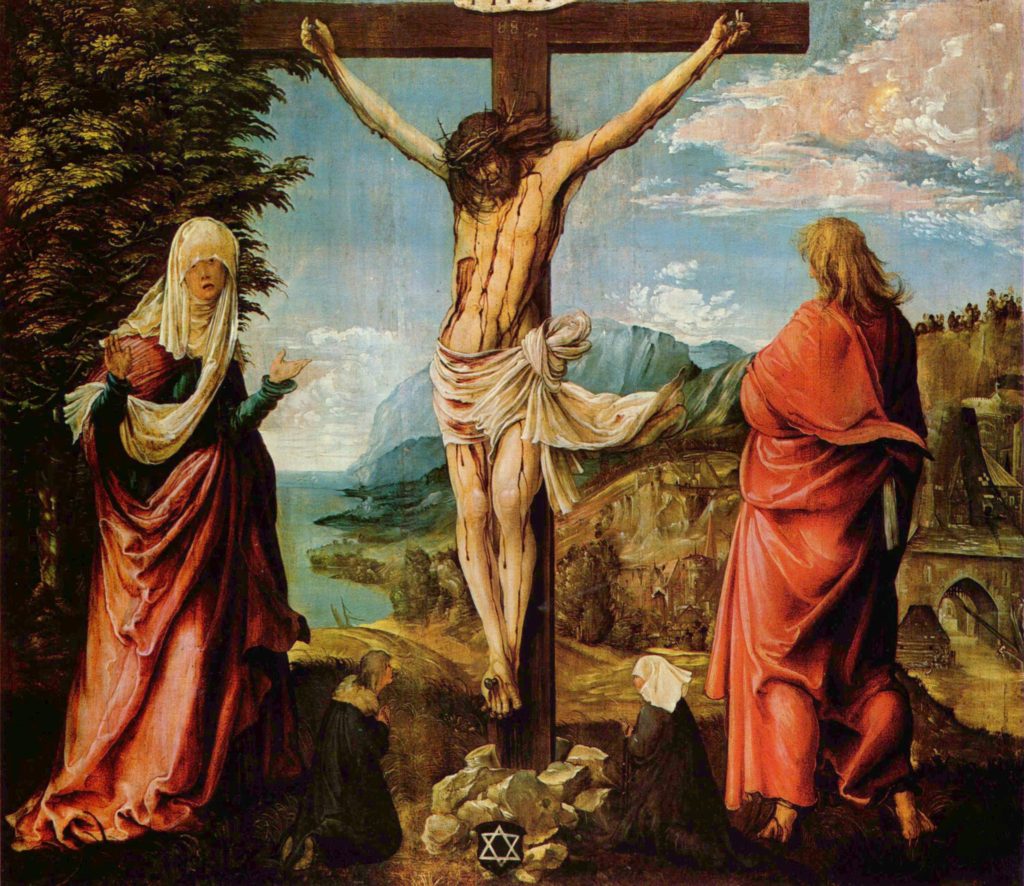Good Friday
John Donne’s “Good Friday, 1613, Riding Westward” is a good poem for all those Christians who, having jobs to do, cannot give their full attention to the day. In Donne’s case, he is traveling to Wales (“I am carried towards the west”), even though his “soul’s form bends to the East” (toward the Holy Land).
As he does in other poems (“Valediction Forbidding Mourning,” “Sun Rising”), Donne turns to astronomy for key metaphors. Our souls are like spheres—which is to say, perfect in their roundness—but our individual souls are “subject to foreign motion.” Whether Donne has in mind the gravitational pull of the sun or the ancient world’s music of the spheres isn’t clear, but it doesn’t matter since the metaphor works in both cases. In any event, our individual souls are “whirl’d” by “their first mover,” even though Donne himself is going in a contrary direction.
He says he’s almost glad this is the case, however, because focusing on the crucifixion would overwhelm him:
Yet dare I almost be glad, I do not see
That spectacle of too much weight for me.
Who sees God’s face, that is self-life, must die ;
What a death were it then to see God die?
But though he is turning his back on Christ—literally by traveling west, metaphorically by not opening up his heart fully—yet Christ and Mary “are present yet unto my memory.” Turning his back also suggests that he is inviting Jesus to whip him into shape:
I turn my back to thee but to receive
Corrections till Thy mercies bid Thee leave.
O think me worth Thine anger, punish me,
Burn off my rust, and my deformity
Here he repeats an idea found in his famous sonnet “Batter my heart, three-personed God” where he asks God to batter through his resistance since he finds his free will operating against his best interests:
That I may rise and stand, o’erthrow me, and bend
Your force to break, blow, burn, and make me new.
If God, by His grace, restores His image to the poet—thereby showing that He knows him—then the poet will turn back again. Unlike the speaker in T. S. Eliot’s “Ash Wednesday,” who laments that he does “not hope to turn again,” Donne assures God that his faith will be renewed. Eliot lived in a more pessimistic age.
Good Friday, 1613, Riding Westward
By John Donne
LET man’s soul be a sphere, and then, in this,
Th’ intelligence that moves, devotion is ;
And as the other spheres, by being grown
Subject to foreign motion, lose their own,
And being by others hurried every day,
Scarce in a year their natural form obey ;
Pleasure or business, so, our souls admit
For their first mover, and are whirl’d by it.
Hence is’t, that I am carried towards the west,
This day, when my soul’s form bends to the East.
There I should see a Sun by rising set,
And by that setting endless day beget.
But that Christ on His cross did rise and fall,
Sin had eternally benighted all.
Yet dare I almost be glad, I do not see
That spectacle of too much weight for me.
Who sees Gods face, that is self-life, must die ;
What a death were it then to see God die ?
It made His own lieutenant, Nature, shrink,
It made His footstool crack, and the sun wink.
Could I behold those hands, which span the poles
And tune all spheres at once, pierced with those holes ?
Could I behold that endless height, which is
Zenith to us and our antipodes,
Humbled below us? or that blood, which is
The seat of all our soul’s, if not of His,
Made dirt of dust, or that flesh which was worn
By God for His apparel, ragg’d and torn ?
If on these things I durst not look, durst I
On His distressed Mother cast mine eye,
Who was God’s partner here, and furnish’d thus
Half of that sacrifice which ransom’d us ?
Though these things as I ride be from mine eye,
They’re present yet unto my memory,
For that looks towards them ; and Thou look’st towards me,
O Saviour, as Thou hang’st upon the tree.
I turn my back to thee but to receive
Corrections till Thy mercies bid Thee leave.
O think me worth Thine anger, punish me,
Burn off my rust, and my deformity ;
Restore Thine image, so much, by Thy grace,
That Thou mayst know me, and I’ll turn my face.


